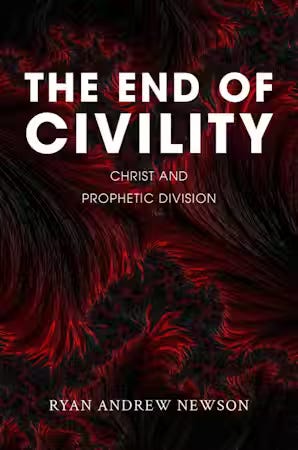The End of Civility
Is civil society overrated?
Ryan Andrew Newson
The End of Divility: Christ and Prophetic Division
Waco, TX: Baylor University Press, 2023.
Believe it or not but I wrote this review last week, long before the Trump assassination attempt. Yet the topic is terrifyingly poignant right now!
Is civility truly a virtue? Ryan Andrew Newson argues, “sort of.”
He points out that sometimes appeals to “civility” provide a license for the colonizer to label the colonized as “savages” and “barbarians.” Or else, he asks people to consider how uncivil Jesus was in the Jerusalem temple and his claim, “Do not suppose that I have come to bring peace to the earth. I did not come to bring peace, but a sword” (Matt 10:34). His hero is the Quaker Benjamin Lay of Pennsylvania who acted with uncivil manners and uncouth decorum in his public antics against slavery. Maybe civility is overrated?
According to Newson, pleas for civility cannot be assessed without considering the context in which they are made. Some appeals to civility merely seek to lessen conflict, even conflict necessary in the struggle for a more just world. But when issued by people struggling for justice on the margins of society, calls for civility can name the types of conflict that might lead to liberation. For Christians, he says, civility is not an intrinsic good or even an instrumental good, but remains subordinate to the call to follow Christ--the Christ who calls people to an ethic of resistance to injustice and solidarity with people who are suffering.
“[W]ithout denying the possibility that ‘incivility’ can become toxic, my primary goal is to convince people that civility is (at best) a neutral quality, that it is subordinate as a virtue (if it even is a virtue), and that it quite often reinforces oppressive ways of moving in the world, despite the appearance of comity - that civility can be a profound barrier to pursuing work of liberation. As such, my primary audience is Christians who praise civility in ways that, I will argue, is not only unwarranted, but also can stymie the kinds of joyous struggles that disciples of Jesus are called to participate in (x).”
My concern with the book is whether ditching the virtue of civility provides a license for public displays of self-righteous contempt for others. I don’t mind the “Just Stop Oil” people chaining themselves to the office doors of British Petroleum, but vandalizing famous pieces of art or stopping working-class people from getting on trains to go to work makes me want to do uncivil things to them!
I’d like to hear Newson discuss Vicky Osterweil’s book In Defense of Looting: A Riotous History of Uncivil Action, where a privileged white woman makes a defence of African-Americans looting Korean businesses in California on the grounds that Koreans are the “new Jews,” the new face of capital.
I think civility matters because it means we solve our political differences without recourse to violence. And that is important because the greatest violence in the world is not done by men who believe that what they do is wicked, but men who believe that what they do is righteous. Newson is aware of this critique, which is why he says he wants to establish civility’s limits rather than eliminate it altogether as a public virtue, but he has a question mark on whether it’s even a virtue.
In addition, Newson is a little too binary in his discussion of some political issues. He claims you either support LGBTIQ inclusion, racial equality, universal healthcare, women in ministry, and class struggle - or you don’t. What he glosses over is that no issue is black and white, there are different options for addressing those issues, and in a politically pluralistic society, we need a modus vivendi for living with differences in peaceable manner. Otherwise, you justify activists punching Lesbians in the face for being “Nazis” if they refuse to date trans-women (a real thing, believe it or not)!
That said, Newson is correct to “problematize” civility, show that it is complicated by context, that there are different types of civility, calls for civil behaviour do sometimes suit the status quo of the powerful, and there is a disruptive element to Christian social teaching that can verge into uncivil social action. Though I do worry that uncivil behaviour and civil resistance need very specific metrics in order to be warranted. But maybe that’s his next book!



Thought provoking for sure!!